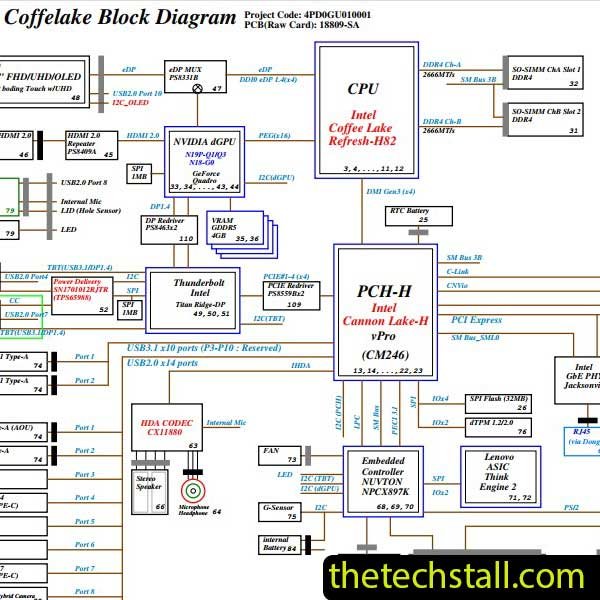
Laptops have become an integral part of our lives, and when they malfunction, it can be frustrating. One critical component often requiring attention is the motherboard. In this article, we’ll explore how the 18809-1 Schematic Diagram revolutionizes the repair process, making it as straightforward as child’s play.
Understanding the intricacies of a motherboard can be challenging, but schematic diagrams provide a roadmap for repairs. They decode the complexity, making it easier for both professionals and enthusiasts to identify and resolve issues efficiently.
Before delving into the specifics of the 18809-1 Schematic Diagram, let’s familiarize ourselves with the Lenovo ThinkPad P1-Gen2 laptop. Known for its performance and durability, this laptop’s motherboard is a crucial element in its functionality.
Users often encounter issues like power failures, overheating, or malfunctioning ports. Identifying these problems is the first step toward effective repairs.
The 18809-1 Schematic Diagram acts as a comprehensive guide, transforming complex motherboard issues into manageable tasks. It simplifies the repair process by providing a visual representation of the circuitry.
To make the most of the schematic diagram, users need to know how to access and interpret it. This section provides a step-by-step guide, ensuring that even those new to motherboard repairs can navigate the diagram with ease.
A successful repair requires the right tools. From soldering irons to multimeters, having the correct equipment on hand is crucial for a smooth repair process.
Motherboard repairs involve delicate components. This section emphasizes safety measures to prevent damage to the laptop and ensure the user’s well-being during the repair process.
Empowering users to take matters into their own hands, this section offers practical tips for DIY repairs using the 18809-1 Schematic Diagram.
Not only does DIY repair save costs, but it also empowers users to understand and take control of their devices. This section explores the advantages of embracing a do-it-yourself approach.
Real-life examples showcase the effectiveness of using the 18809-1 Schematic Diagram in resolving diverse motherboard issues, instilling confidence in users looking to undertake their repairs.
While DIY repairs have their merits, challenges may arise. This section addresses common difficulties and provides solutions to ensure a successful repair experience.
Navigating the world of motherboard repairs is made easier with thetechstall support. The Tech Stall team collects all the resources needed to repair desktop and laptop motherboard circuits. You are given the opportunity to download all these resources for free to repair in less time, less cost and easier. You can get updated resource information by subscribing to TheTechStall YouTube channel.
The 18809-1 Schematic Diagram transforms the daunting task of repairing a Lenovo ThinkPad P1-Gen2 laptop motherboard into an accessible and even enjoyable process. With the right tools, knowledge, and community support, anyone can become a proficient DIY laptop repair enthusiast.
In the intricate world of laptop repairs, the need for precision and efficiency is paramount. When faced with the task of repairing a Lenovo laptop, even armed with a schematic diagram, repair enthusiasts often find themselves turning to BoardView Files for a more comprehensive solution.
BoardView Files, in essence, provide a visual representation of a laptop’s motherboard, detailing components and their connections. While schematic diagrams offer a similar insight, BoardView Files take it a step further by offering a graphical view. This includes not only the components’ placement but also the intricate pathways they create on the motherboard.
Schematic diagrams are undoubtedly valuable in understanding the electronic architecture of a device. However, when it comes to practical repairs, they have limitations. Analyzing components and connections on paper might not provide the depth needed to troubleshoot effectively. This is where BoardView Files complement schematic diagrams, offering a more visual and tangible approach to repair diagnostics.
Imagine the complexity of a Lenovo laptop’s circuitry. BoardView Files provide a clear and visual representation, allowing repair technicians to navigate through the intricate web of connections with precision. Whether it’s identifying faulty components or troubleshooting specific pathways, BoardView Files empower technicians to tackle repairs with a higher degree of accuracy.
Looking ahead, the use of BoardView Files is likely to evolve. As technology advances, incorporating artificial intelligence into the repair process could further enhance diagnostics and streamline repairs. This could potentially revolutionize the laptop repair industry, making it more accessible and efficient.
Repair shops worldwide share positive experiences with BoardView Files. The ability to troubleshoot accurately and efficiently has led to successful repairs that may have otherwise been challenging. Community collaboration and knowledge-sharing play a pivotal role in amplifying the impact of BoardView Files.
Lenovo Laptop Motherboard Circuit BoardView File
BoardView Files emerge as a vital tool, especially in the realm of Lenovo laptop repairs. Their visual representation adds a layer of depth to diagnostics, ensuring that repairs are not just efficient but also aligned with the unique architecture of Lenovo laptops. As the industry evolves, integrating BoardView Files into the repair process could be a game-changer, fostering a more sustainable approach to laptop repairs.
Share with friends
thetechstall.com would like to share with you all the resources you need to repair desktop and laptop motherboards for free.
Developed By: Ibrahim Hossen